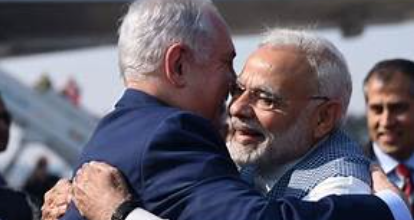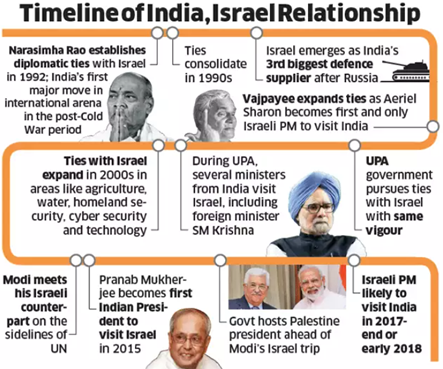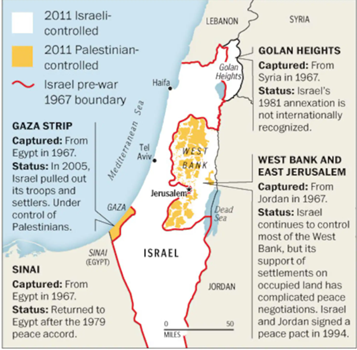India-Israel Ties Strengthen Amid Challenges
Relevance
- GS Paper 2: India and its Neighborhood- Relations.
- Tags: #Israel #IndiaIsraelRelations #Hamas #Palestine #UPSC #CurrentAffairs
Why in the News?
In an unprecedented escalation, Hamas launched a full-scale attack on Israel, with hundreds infiltrating and targeting civilians. Israel has declared a ‘state of war’ in response to the aggression.
India-Israel Relations: A 30-Year Journey
Historical Background
Early Post-Independence Stance
- After gaining independence in 1947, India’s leaders, including Jawaharlal Nehru and Mahatma Gandhi, were staunch supporters of the Palestinian cause.
- They rejected the notion of creating nations based on religious lines, in sync with their opposition to India’s partition.
Voting at the UN
- India consistently voted against the partition of Palestine at the United Nations.
- It also voted against Israel’s admission to the UN.
- India eventually recognized Israel in 1950 following Turkey and Iran but did not grant diplomatic privileges in New Delhi until much later.
India’s Engagement with Palestine
The Emergence of PLO
- In the late 1960s and early 1970s, India engaged with the Palestine Liberation Organization (PLO) and recognized it as the legitimate representative of the Palestinian people.
- This was in line with India’s support for the largest political faction within the PLO, Al Fatah.
- India, under leaders like Indira Gandhi and Rajiv Gandhi, maintained a strong stance in favor of the Palestinian struggle.
- India upgraded the Palestine Liberation Organization (PLO) office in New Delhi, granting it diplomatic immunities and privileges.
- PLO leader Yasser Arafat became a frequent visitor to India, strengthening India-Palestine relations.
Shifts in Political Landscape
- India’s unwavering support for Palestine faced criticism, particularly as it conflicted with the BJP’s stance and the Arab countries’ neutrality during India’s wars.
- Israel, on the other hand, provided India with arms and ammunition during various conflicts.
Shift in West Asia
- The invasion of Kuwait by Iraq in 1990 led to a shift in alliances in West Asia.
- The disintegration of the Soviet Union also prompted India to reassess its West Asia policy.
- This eventually resulted in India establishing full diplomatic relations with Israel India’s Diplomatic Relationship with Israel
Establishment of Diplomatic Ties
- India formally recognized Israel, with diplomatic ties established in January 1992.
- Israel opened its embassy in Delhi on February 1, 1992, while India’s embassy in Tel Aviv opened on May 15 the same year.
- This decision was made shortly after China also established diplomatic relations with Israel.
End of Cold War
- The end of the Cold War reduced ideological hostilities towards Israel.
- Furthermore, the rise of the BJP in Indian politics in the early 1990s led to a more open approach to Israel.
Diplomatic and Military Cooperation
- India’s relationship with Israel became crucial during the Kargil conflict in 1999.
- Israel provided precision target bombs, aiding India in a time of need.
- Subsequently, high-profile visits between the countries took place, further strengthening ties.
First visit by an Indian Prime Minister
- Prime Minister Narendra Modi visited Israel in 2017, marking the first visit by an Indian Prime Minister
- He did not visit Palestine during this trip, a departure from past ministerial visits.
- Despite this shift, India maintained its support for the Palestinian cause and engaged with various regional players.
Economic and Commercial Relations
Historical Perspective
- India-Israel bilateral trade and economic relations have come a long way since 1992 when merchandise trade was only $200 million, primarily comprising diamonds.
- Rapid Progress: By FY 2022-23, merchandise trade diversified and reached $10.1 billion (excluding defense), with a trade surplus in India’s favor.
Export and Import Trends
- In FY 2022-23, India’s merchandise exports to Israel stood at $7.89 billion, while Israeli exports to India were $2.13 billion.
- Diversification in trade sectors is noticeable, including electronic machinery, high-tech products, communications systems, and medical equipment.
- India is Israel’s 2nd largest trading partner in Asia and its 7th largest trading partner
Key Exports
- Major Indian exports to Israel include pearls, automotive diesel, chemical products, machinery, textiles, and agricultural products.
- In contrast, Israeli exports to India encompass pearls, chemical products, machinery, petroleum oils, defense equipment, and transport machinery.
Investment
- Cumulative Outward Direct Investment (ODI) from India to Israel from April 2000 to May 2023 reached $383 million.
- Indian companies are actively investing in Israel, marking their presence through mergers, acquisitions, and branch offices.
- FDI Inflows: From Israel to India, direct Foreign Direct Investment (FDI) amounted to $284.96 million from April 2000 to March 2023.
I2U2 Grouping
- Stands for India, Israel, the UAE, and the US.
- It was formerly known as the ‘International Forum for Economic Cooperation’ and is also referred to as the ‘West Asian Quad.’
- Aim: The group aims to strengthen economic partnerships, identify areas of cooperation, and encourage joint investments six key sectors: water, energy, transportation, space, health, and food security.
- Private sector involvement will modernize infrastructure, promote green technologies, and improve public health.
Agriculture
- A comprehensive Work Plan for cooperation in agriculture was signed in 2006.
- Bilateral projects are implemented through MASHAV and CINADCO.
- 30 Agriculture Centers of Excellence are operational in 12 Indian states.
Water Resources
- An MOU on Water Resources Management and Development Cooperation was signed in November 2016, formalizing ongoing cooperation.
- Several MOUs were signed to further water conservation and management in various Indian states.
Industrial and R&D Cooperation
- India-Israel Initiative for Industrial R&D (i4RD): Established in 2005, this initiative supports joint industrial research and development projects with a focus on global commercialization.
- India-Israel Industrial R&D and Innovation Fund (I4F): An MoU for the fund was signed in 2017, with nine rounds of calls for proposals held between 2018 and 2022. The tenth round commenced in March 2023.
Innovation and Science & Technology
Joint Committee on S&T
- Established in 1993, this committee oversees India-Israel cooperation in science and technology.
- The India-Israel Industrial R&D and Innovation Fund (I4F) plays a crucial role in enabling joint R&D projects.
Bilateral Programs
- In September 2020, Israel’s Startup Nation Central and India’s International Centre for Entrepreneurship and Technology (iCREATE) signed a bilateral program to accelerate innovation and tech cooperation.
Defense Cooperation
- Indian naval ships and defense officials have made goodwill visits to Israel, enhancing defense ties.
- Multilateral exercises and high-level visits have further solidified defense cooperation.
Health
Agreement on Cooperation in Health
- In December 2020, India and Israel signed an agreement to deepen strategic partnerships in the health sector, including R&D collaboration.
- Both countries have collaborated in dealing with the Covid-19 pandemic.
People-to-People Relations
Indian Community in Israel
- Approximately 18,000 Indian citizens reside in Israel, including caregivers, diamond traders, IT professionals, and students.
- Prime Minister Narendra Modi and External Affairs Minister Dr. Jaishankar have interacted with the Indian-origin community in Israel.
Tourism
- Air India flights between New Delhi and Tel Aviv, initiated in March 2018, have significantly boosted tourism and people-to-people contacts.
Indian Students
- Around 900 Indian students pursue higher education in Israel, mainly at the doctoral and post-doctoral levels.
Indian-Origin Jews
- Israel is home to approximately 85,000 Jews of Indian origin, mainly from Maharashtra (Bene Israelis), Kerala (Cochini Jews), and Kolkata (Baghdadi Jews).
- Recent immigrants from North-Eastern states of India (Bnei Menashe) have also joined this community.
Pravasi Bhartiya Samman
Several individuals of Indian origin in Israel have received the Pravasi Bhartiya Samman, recognizing their achievements in various fields.
- Eliyahu Bezalel (2005): Distinguished agriculturalist from Kochi, he was the first Israeli of Indian origin to receive this award.
- Sheikh Munir Ansari (2011): Trustee of the Indian Hospice in Jerusalem, representing a unique Indian connection to the Holy City.
- Lael A. Best (2017): An Israeli cardio-thoracic surgeon of Indian origin recognized for his achievements.
- Reena Vinod Pushkarna (2023): A prominent restaurateur in Israel, awarded for her contributions to business and community welfare.
National Convention of Indian-Origin Jews
- Annual conventions bring together around 5,000 Indian-origin Jews of Israel to celebrate their heritage and culture.
Culture
Cultural Exchange Programme
- India and Israel renewed their Cultural Exchange Programme in August 2020, facilitating cultural exchanges across various art forms and youth exchanges.
Yoga and Ayurveda
- Yoga and Ayurveda are popular in Israel, with the International Day of Yoga celebrated enthusiastically.
- The Indian Cultural Centre in Tel Aviv plays an essential role in promoting cultural ties.
The India-Israel relationship has evolved over three decades, navigating challenges and shifts in policy, partnership, encompassing trade, agriculture, water management, defense, healthcare, and culture. While it has grown stronger, India continues to balance its historical ties with the Palestinian cause. Both countries aim to protect their long-term interests amid changing geopolitics in West Asia.
Source: Indian Express, LiveMint, Ministry of External Affairs
Mains Question
Discuss the historical evolution of India-Israel relations and their impact on contemporary bilateral ties. What are the key areas of cooperation, Analyze their significance in strengthening the bilateral relationship?






